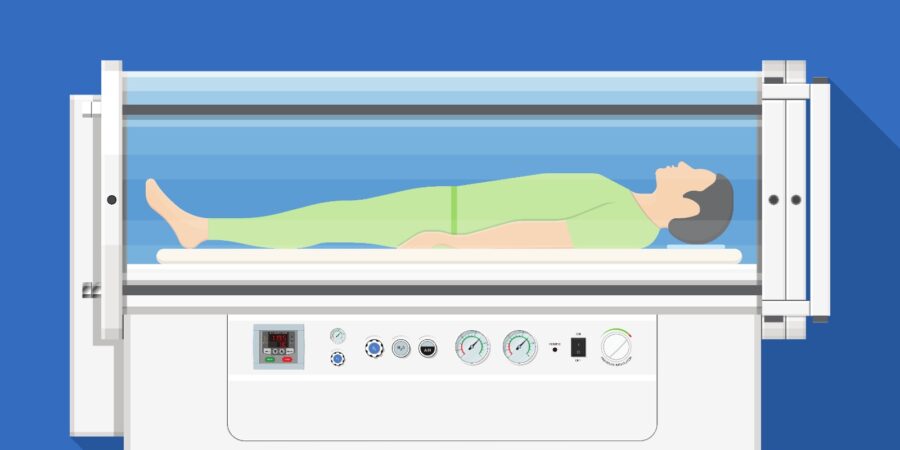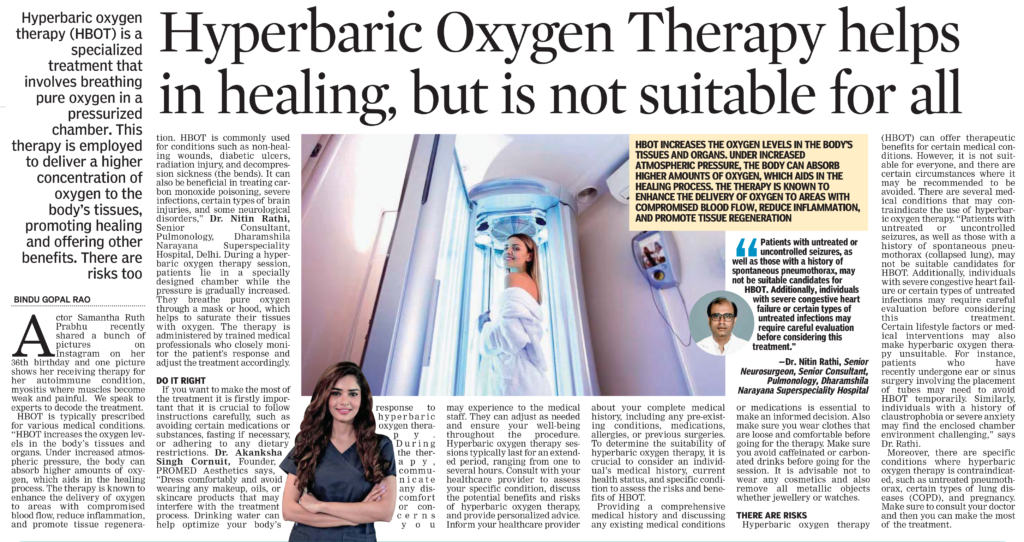While hyperbaric oxygen therapy (HBOT) can be beneficial for many individuals, there are certain situations where it may not be recommended or should be approached with caution. HBOT should be administered under the guidance and supervision of a qualified healthcare professional. Here are some instances where HBOT may be contraindicated or require careful evaluation:
- Certain lung conditions:
- History of ear surgery:
- Uncontrolled high fever:
- Severe congestive heart failure:
- Pregnancy
- Certain medications: Some medications may interact with HBOT or increase the risk of oxygen toxicity. These may include certain chemotherapeutic drugs, disulfiram (used to treat alcohol dependence), and certain antineoplastic agents.
- Claustrophobia or anxiety disorders
These are general considerations, and individual circumstances can vary. It is crucial to consult with a healthcare professional experienced in hyperbaric medicine who can assess your specific situation, medical history, and potential risks and benefits before deciding on HBOT.
Hyperbaric oxygen therapy (HBOT) offers several potential benefits due to the increased delivery of oxygen to body tissues.
Improved wound healing by promoting the formation of new blood vessels (angiogenesis) and stimulating tissue growth, which can accelerate the healing process in non-healing wounds,
Reduced tissue damage and improved recovery hereby minimizing damage caused by conditions like crush injuries, compartment syndrome, or severe infections. It can also support recovery after surgeries by enhancing tissue repair and reducing inflammation.
Enhanced infection control: HBOT creates an unfavourable environment for certain bacteria that thrive in low-oxygen conditions (anaerobic bacteria). HBOT can be used as a supportive treatment alongside radiation therapy. HBOT is the primary treatment for decompression sickness, a condition that occurs when nitrogen bubbles form in the bloodstream due to rapid changes in pressure, as seen in scuba divers. Neurological conditions – HBOT may have potential benefits for certain neurological conditions, such as traumatic brain injury, stroke, and certain neurodevelopmental disorders.
By increasing the concentration of oxygen in the body’s tissues, HBOT promotes healing, reduces inflammation, and provides therapeutic advantages in various ways.. This can be particularly beneficial for individuals with non-healing wounds, diabetic ulcers, or radiation injuries. In addition, HBOT can help reduce inflammation. The increased oxygen levels in the body contribute to the suppression of certain inflammatory processes, potentially alleviating symptoms associated with conditions such as chronic wounds, infections, and certain types of inflammatory bowel disease. Hyperbaric oxygen therapy has also shown positive effects on certain neurological conditions. It aids in the recovery of individuals who have experienced traumatic brain injuries or strokes by improving oxygenation in the affected brain regions and promoting neural repair. Furthermore, HBOT has been utilized in the treatment of carbon monoxide poisoning, decompression sickness, and severe infections. By rapidly increasing oxygen levels in the body, it helps to alleviate symptoms and prevent further complications.
Preparing for hyperbaric oxygen therapy (HBOT) involves a few important steps to ensure a safe and effective treatment session. Before starting HBOT, it is crucial to discuss your medical history, current medications, and any existing health conditions with your healthcare provider. They can provide specific guidance and evaluate the suitability of HBOT for your situation. Specific pre-treatment instructions may include avoiding certain medications or substances, such as tobacco and alcohol, prior to the session. One should empty their bladder and bowels before entering the hyperbaric chamber to minimize discomfort during the session.
Read the full story that first appeared in Deccan Chronicle dated July , 2023 here:

